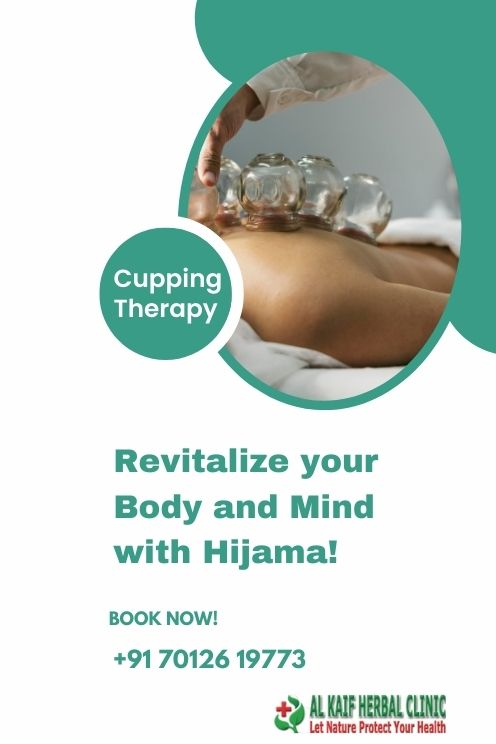Cupping Therapy / Hijama in Krishnagiri
Hijama: An Ancient Healing Art for Modern Times
Hijama, also known as wet cupping, is an ancient healing technique that has been practiced for thousands of years. It involves creating small incisions on the skin and using cups to draw out stagnant blood and toxins from the body. While Hijama/ Cupping therapy in Krishnagiri has been used to treat a variety of ailments and is becoming increasingly popular in modern times.

History of Hijama
Hijama has been practiced by many cultures throughout history, including the ancient Egyptians, Greeks, and Chinese. It is said to have been introduced to the Prophet Muhammad (peace be upon him) and has been an integral part of Islamic medicine ever since. The practice was also widely used in Europe during the Middle Ages and was considered a standard medical treatment until the 19th century.
How Hijama Works
Hijama involves creating small incisions on the skin and placing cups over the incisions to create a vacuum. This vacuum draws out stagnant blood, lymphatic fluid, and toxins from the body, allowing fresh blood and nutrients to flow to the affected area. The cups are typically left in place for a few minutes and then removed. The incisions are very small and heal quickly, leaving no visible scars.
Benefits of Hijama
Promoting blood flow: By drawing out stagnant blood and increasing circulation, hijama can help relieve pain and promote healing.
Boosting the immune system: Hijama is thought to stimulate the immune system and help the body fight off infections and illnesses.
Removing toxins: Hijama can help remove toxins from the body, which can improve overall health and prevent disease.
Reducing inflammation: Hijama can help reduce inflammation in the body, which is a common cause of pain and disease.
Improving digestion: Hijama is believed to improve digestion and alleviate gastrointestinal problems.
Hakim Dr. Syed Shah Anisuddin Qadiri - Harnessing the Healing Power of Unani for Hijama
Hakim Dr. Syed Shah Anisuddin Qadiri is a renowned expert in hijama and Unani medicine. With over 25 years of experience in the field, he has helped countless patients achieve optimal health and wellbeing through the power of hijama and Unani medicine. Unani medicine is a holistic approach to healthcare that has its roots in ancient Greece and has been practiced for centuries in the Islamic world. It emphasizes the use of natural remedies and the importance of maintaining a healthy balance between the body, mind, and spirit.
At Al Kaif Herbal Clinic, he uses the principles of Unani medicine to guide his hijama practice. He takes a personalized approach to each patient’s care, taking into account their unique needs and medical history. His expert technique and gentle approach to hijama ensure that patients receive the full benefits of the treatment while minimizing discomfort.
Is Hijama Safe?
When performed by a trained practitioner like Hakim Dr. Syed Shah Anisuddin Qadiri, hijama is generally considered safe. The cups used in hijama are typically made of glass, plastic, or bamboo and are sterilized before each use. The incisions are small and heal quickly, and there is little risk of infection. However, as with any medical procedure, there are some risks involved, and hijama may not be suitable for everyone. It is important to consult with a qualified practitioner before undergoing hijama.
Hijama is an ancient healing art that has stood the test of time. It is a safe and effective treatment for a variety of ailments and is gaining popularity in modern times. Whether you are seeking relief from pain or simply want to maintain optimal health, hijama may be a beneficial addition to your wellness routine. Al Kaif Herbal Clinic is the best place to experience the benefits of hijama, with expert practitioners who provide personalized care to help you achieve optimal health and wellbeing.
